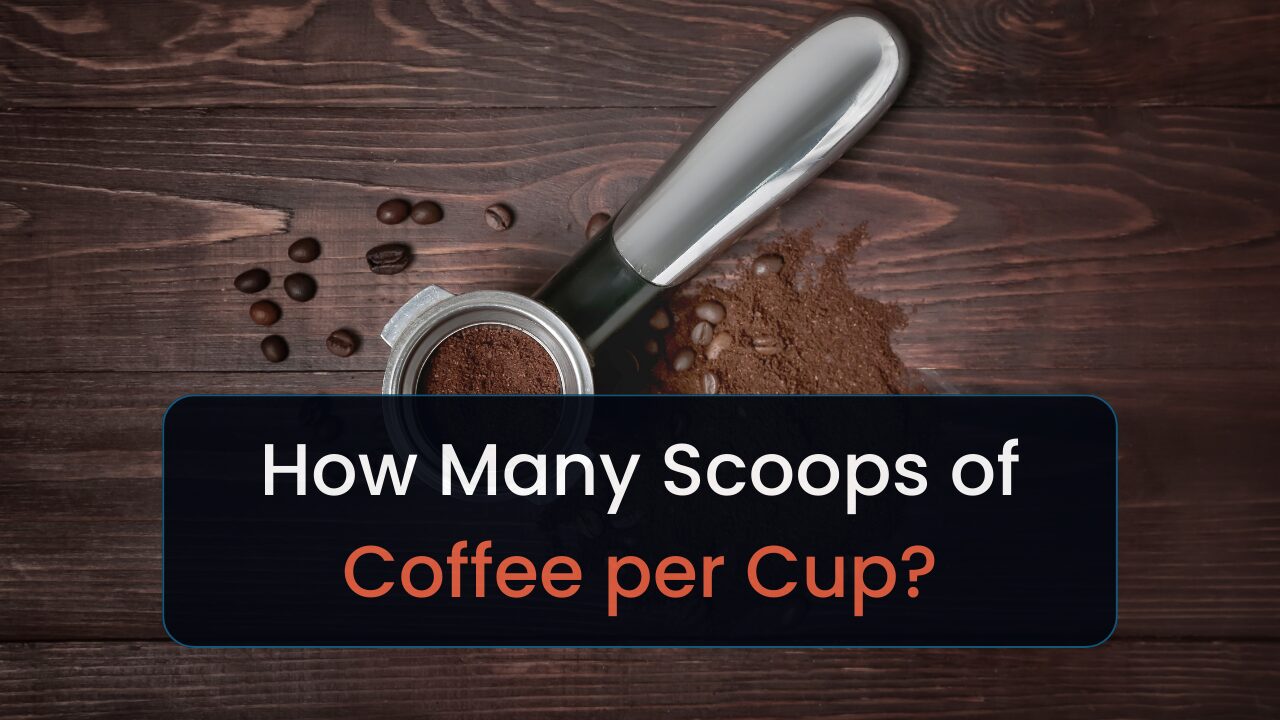I drink a lot of caffeine, but too much makes me jittery. To limit the jittery(ness) and to get my caffeine fix, I want to ensure I’m not exceeding a healthy amount of daily caffeine.
To help you not exceed this “cap” as well, I’ll cover these points:
- Amount of caffeine in a cup of coffee
- Caffeine contents in different coffee types
- Caffeine contents in different bean types
- What affects caffeine content in coffee
- The caffeine content in coffee from various brands & restaurants
- Coffee’s caffeine vs. other caffeine types
- What happens when you drink too much
Hold off on brewing your coffee, and keep reading.
Caffeine Calculator
How Much Caffeine Is In A Cup Of Coffee?
An 8-fluid-ounce (0.24 l) cup of coffee has between 80–100 milligrams (mg) of caffeine. The amount of caffeine per drink will depend on how you make your coffee and other factors.
Some drinks, like the Red Eye, may have up to 300 mg of caffeine per 8 oz. Some coffee brands (e.g., Devil Mountain Coffee Company) have up to 1,555 mg of caffeine per 12 fluid (fl) ounces.
I’ll cover more on what impacts caffeine content in coffee later. For now, I want to discuss the different types of drinks and their content.
Amount of Caffeine in Different Coffees
Compare the amount of caffeine in different types of coffee:
| Coffee Type | Caffeine Content (per serving) * | Serving Size |
| Espresso Single Shot | 63 mg | 1 oz (29 ml) |
| Espresso Double Shot | 126 mg | 2 oz (59 ml) |
| Decaf Coffee | 2–5 mg | 8 oz (236 ml) |
| Instant Coffee | 30–90 mg | 8 oz |
| Espresso-based drinks | 63–300 mg | Varies |
| Brewed Coffee | 50–272 mg | Varies |
| K-Cup | 75–150 | 1 pod |
| Nespresso | 50–200 | 1 pod |
Caffeine content in different types of coffees compared.
I’ll go more in-depth with numbers and what makes these drinks different throughout the following sections.
Espresso
Espresso has different caffeine levels depending on the number of shots used:
- 1 shot: 63 mg of caffeine
- A shot of espresso is 1–1.75 oz (30–50 ml)
- 2 shots: 125 mg of caffeine
- A couple of shots of espresso is 2+ oz (59+ ml)
Make espresso by shooting steam (or water) through ground coffee beans.
Decaf Coffee
In most cases, decaffeinated coffee has 2.0–5.0 mg of caffeine.
Decaffeinating removes around 97% of the caffeine from coffee beans [1]. Companies like Baltimore Coffee claim to have a Swiss Water decaffeination process that eliminates 99.99% of caffeine [2].
I couldn’t find studies to refute these claims.
Let’s move on to everyone’s favorite way to make coffee—
Instant Coffee
On average, instant coffee has 30–90 mg of caffeine. Many brands may have more or less caffeine content.
NESCAFÉ® NESCAFÉ® TASTER’S CHOICE will have 30–35 mg of caffeine per cup. Whereas, Café Bustelo Espresso Instant Coffee has 60–90 mg.
Instant coffee comes in the form of packets or bags that resemble tea bags. Boil a cup of water, pour in your mix (or seep your bag), and drink when it’s comfortable for you to do so.
K-Cup
On average, K-Cups will have between 75 and 150 mg of caffeine per 8.0 oz cup. The actual amount will depend on what Keurig pods you use.
Nespresso Capsule & Pods
Most Nespresso espressos have 50–100 mg of caffeine per cup. The value above refers to the following capsule types:
- Original Espressos and Espresso Lungos
- Vertuo Espressos
- Gran Lungos
- Double Espressos
Their Vertuo coffees have around 170–200 mg per 7.77 and 114 oz. And their Carafe pour-Over Style coffee has about 200 mg per 18 oz (532 ml).
Espresso-Based Drinks
Compare caffeine levels in different espresso-based drinks:
| Coffee Type | Caffeine Content (per serving) * | Serving Size | Preparation Method |
| Latte | 63–175 mg | 8 oz | Espresso with steamed milk and a small layer of foam |
| Cappuccino | 63–175 mg | 8 oz | Espresso with equal parts steamed milk and foam |
| Ristretto | 45–75 mg | 1 oz | A “restricted” espresso shot with less water |
| Macchiato | 63–175 mg | 2 oz | Espresso with a small amount of foamed milk |
| Americano | 63–154 mg | 8 oz | Espresso diluted with hot water |
| Mocha | 63–175 mg | 8 oz | Latte with added chocolate syrup or powder |
| Red Eye | 200–300 mg | 8 oz | Drip coffee with a shot of espresso |
| Flat White Coffee | 205+ mg | 8 oz | Espresso shots with steamed milk and a thin layer of foam |
Caffeine content in different types of espresso-based drinks compared.
Why include these drinks here?
You’d make these drinks by mixing varying amounts of milk and espresso. Hence, they deserve their own section. Considering the differences among these drink types is important because brewing methods will result in different caffeine levels.
Ristretto has less caffeine than a latte because the latter has a longer extraction time.
Anyway:
I’ll cover the differences throughout the following sections.
Latte, Macchiato, Mocha, & Cappuccino
On average, Mochas, cappuccinos, macchiatos, and lattes will have 63–175 milligrams of caffeine. All drinks involve at least a shot of espresso. Thus, they’ll have the same amount of caffeine.
The number of shots used, coffee beans, roasts, and grinds will impact the amount of caffeine in your drink.
But how are they made?
Latte:
- It contains steamed milk and espresso
- Pour milk on top of espresso
- Has a layer of foam on top
- Generally larger than other espresso drinks
Macchiato:
- Espresso with a small amount of steamed milk
- Pour milk on top of espresso
- It has a layer of foam on top
- Smaller than a latte
Mocha:
- Espresso with chocolate syrup or powder and steamed milk
- May also have whipped cream and chocolate shavings on top
- Sweeter than other espresso drinks
- Smaller than a latte
Cappuccino:
- Equal parts of steamed milk, foam, and espresso
- Foam is spooned on top of the espresso
- Smaller than a latte
- Generally stronger than a latte due to the ratio of espresso to milk
Ristretto
Ristretto will have on average of 45–75 mg of caffeine.
Here’s how you’d make a ristretto:
- Grind fresh coffee beans to a fine texture
- Tamp the coffee grounds into a portafilter with a tamper
- Extract the espresso shot using less water than usual
- The ristretto shot is a shorter and more concentrated espresso shot, with a thicker crema and a sweeter taste compared to a regular espresso shot
Americano
An Americano has 63–154 mg of caffeine.
Depending on whether it’s hot or poured over (iced), you may have more or less. Hot drinks tend to have more caffeine since it extracts more caffeine from coffee beans.
An Americano is a type of coffee made by adding hot water to a shot or two of espresso. The result is a larger, less concentrated coffee beverage similar in strength to drip coffee but with a more distinct espresso flavor.
Red Eye
A red eye has 200–300 mg of caffeine.
Make this drink by combining a shot of espresso with a cup of regular drip coffee. The resulting drink has a higher caffeine content than a regular cup of coffee and a stronger, more robust flavor. It is often ordered by those seeking an extra caffeine boost.
Flat White
Flat white coffee has around or more than 205 milligrams of caffeine.
It has more caffeine than other brews and drinks due to the higher concentration of espresso.
It’s made by pouring a shot or two of espresso over steamed milk, creating a smooth, velvety texture.
Brewed Coffee
Here’s what caffeine content in different brew types will look like:
| Coffee Type | Caffeine Content (per 8 oz) * | Preparation Method |
| Cold Brew | 100–200 mg | Soaking coarse coffee grounds in cold water for 12–24 hours |
| Drip Coffee | 70–140 mg | Hot water poured over coffee grounds in a paper filter |
| Turkish Coffee | 50–80 mg | Finely ground coffee boiled in a cezve (small pot) with sugar and cardamom |
| French press | 80–120 mg | Coarse coffee grounds steeped in hot water, then pressed through a filter |
| Percolated Coffee | 64–272 mg | Hot water repeatedly forced through coffee grounds in a percolator |
Caffeine contents in different brewed coffee types compared.
Cold Brew Coffee
Cold brew coffee has 100–200 mg of caffeine.
It has less caffeine than hot coffee, since it doesn’t extract as much caffeine as hot water.
Make cold brew by steeping coffee grounds in water at room temperature (or in a refrigerator) for 12–24 hours. Brewing your drink for longer may result in more caffeine. Since the water will have more time to extract the caffeine from the beans.
Pour Over/ Drip Coffee
Drip coffee (or pour-over) has 70–140 mg of caffeine.
It’s a method of brewing that involves pouring hot water over ground coffee beans in a filter. The water passes through the filter and the coffee grounds, extracting the flavor and caffeine as it drips into a carafe or mug below.
Turkish Coffee
A 2.0 oz (75.6 gram) cup of Turkish coffee has around 50 mg of caffeine.
The value will depend on the types of beans and roast used. As any coffee bean will work with brewing Turkish coffee.
To make this coffee, brew finely ground beans and water in a small pot called a cezve/ibrik. From there, you’ll pour out the cream part in small portions.
The finer grounds for this brew may cause a higher caffeine content.
French Press Coffee
French press brews typically have 80–120 mg of caffeine.
Since they have more course grounds (large grinds), your drink will have less caffeine.
Percolated Coffee
Percolated coffee has 64–272 mg of caffeine.
It’s a method where boiling water is repeatedly forced through a chamber of coffee grounds by gravity or pressure. The water boils in a separate section; then, a tube pushes it over the coffee grounds.
After which, it’ll drip into the boiling water.
How Much Caffeine is in a Coffee Bean?
A coffee bean will have around 0.62 to more than 4 milligrams of caffeine. The actual amount will depend on the type of bean used and whether it’s roasted.
I’ll cover how the above factors will impact the caffeine value in your beans.
Do Light or Dark Roasts Have More Caffeine?
Light coffee beans tend to have a bit more caffeine than roasted beans. Severe roasting resulted in a 5.4% loss in caffeine during one experiment [3].
Caffeine Contents in Arabica vs. Robusta Coffee Beans
Compare different species of arabica and robusta coffee beans and their caffeine contents:
| Species | Caffeine Content (per 100 g) * |
| Robusta | >4 |
| Kouillon | 2.36 mg |
| Laurenti | 2.45 mg |
| Mundo Nuvo † | 1.11 mg |
| Typico † | 1.05 mg |
| Catuai † | 1.34 mg |
| Laurina † | 0.62 mg |
Caffeine contents in various arabica and robusta species compared.
† Arabica beans.
Robusta beans have around twice as much caffeine as various arabica species.
Why do robusta roasts have more caffeine than their counterpart? Because robusta produces extra caffeine to ward off bugs. The quantity of caffeine they produce is toxic to insects.
And what are the differences between these beans?
Robusta beans have a bitter and stronger taste with a grainy overtone. Arabica is more acidic, yet has a sweeter and smoother taste. You may even notice hints of chocolate, sugar, or berries in some beans.
What Factors Affect Coffee’s Caffeine Content?
Here’s what affects coffee’s caffeine content:
- Serving size: you’ll have more caffeine in a 24 oz of coffee than 1 oz
- Type of coffee: different brews & drink types will impact caffeine levels
- Drinks with higher concentration of coffee (e.g, percolated coffee) will have more espresso than flat white coffee
- Roasting method: sources suggest lighter roasts have more caffeine than dark [4]
- Coffee bean type: many beans have varying caffeine levels
- Robusta beans, for instance, will have more than arabica
- Grind consistency: finer grinds tend to have more caffeine
Commercial Coffee Caffeine Contents Compared
Here are EXAMPLES of how much caffeine different brands have in their drinks:
| Coffee Brand | Caffeine Content (per 8 oz) * |
| McDonald’s | 114 mg |
| Starbucks | 180+ mg |
| Dunkin’ Donuts | 118–273 mg § |
| 7-Eleven | 140 mg |
| Death Wish | 472 mg |
Caffeine contents in different brands’ coffee compared.
§ Per 10 fl oz.
The table is an EXAMPLE and may not accurately reflect the caffeine contents each brand’s drinks have. Keep reading and you’ll find better examples.
McDonald’s
McDonald’s has (an estimated) 8.0–180 mg of caffeine in their McCafe drinks. McDonald’s doesn’t list caffeine values on their site.
However:
A 2017 test BuzzFeed News conducted suggested they have an average of 14.3 mg per—229 mg per 16 fluid ounces (473 ml) [5].
Starbucks
Here’s the caffeine content for different Starbucks coffee sizes using a hot Pike Place Roast [6]:
- Short: 180 mg
- Short is 8 oz (236 ml)
- Tall: 270 mg
- Tall is 12 oz (354 ml)
- Grande: 330 mg
- Grande is 16 oz (463 ml)
- Venti: 415 mg
- Venti is 24 oz (709 ml)
Compare those values to their Nitro Cold Brew:
- Tall: 215 mg
- Grande: 280 mg
And to their Iced Café Americano:
- Tall: 150 mg
- Grande: 225 mg
- Venti: 300 mg
There’s another level to consider: customization. Adding additional shots, whatever roast option you opt for, and Long Shot versus Ristretto will also impact your dessert drink’s caffeine content.
Opting for a decaffeinated roast will result in the lowest caffeine content.
Dunkin’ Donuts
Dunkin’ Donuts’ coffee has the following caffeine values [7]:
| Coffee Type | Small (10 fl oz) * | Medium (14 fl oz) * | Large (20 fl oz) * |
| Americano (Hot & Iced) | 237 | 284 | 371 |
| Hot Latte | 118 | 166 | 252 |
| Cold Brew | 174 | 260 | 347 |
| Macchiato | 273 | 284 | 371 |
| Cappuccino | 118 | 166 | 252 |
Caffeine values in Dunkin’ Donuts coffee compared.
And a single shot of their espresso has 118 milligrams (mg) of caffeine.
Drinking a single large cup from Dunkin’ Donuts would almost exceed the caffeine most bodies can handle daily (400 mg).
7-Eleven
7-Eleven has, on average, 280 mg of caffeine for their Regular Exclusive Blend (16 oz).
The massive convenience store giant doesn’t list the values anywhere on their site. I got this number from the BuzzFeed News link I mentioned earlier. The actual amount of caffeine will vary depending on where in the world you get your coffee.
The 7-Eleven coffee I had in the U.S.—I can’t remember the size—was much stronger than the cups I’ve had in Japan.
Death Wish
Death Wish Coffee has 59 mg of caffeine per fluid ounce. An 8.0 ounce cup of joe would result in more than 400 mg of caffeine. Depending on how you brew your drink.
Caffeine Contents in Coffee vs. Other Sources
Let’s see whether coffee’s the best way to get caffeine:
| Drink/Supplement | Caffeine Content * | Serving Size |
| Espresso | 63 mg | 1 shot (1.5–2 oz) |
| Black Tea | 47 mg | 8 oz |
| Supplements | Varies | Varies |
| Milk Chocolate | 6 mg | 1 oz (29 ml) |
| Cola | 24–46 mg | 8 oz |
| Yerba Mate | 30–50 mg | 8 oz |
| Red Bull | 80 mg | 8.4 oz (248 ml) |
| Monster Energy Drink | 86 mg | 8 oz |
| Guarana | 20–50 mg | 8 oz |
Caffeine content in different foods, beverages, and supplements compared.
How Much Caffeine is in a Cup of Coffee vs. Tea?
Determine whether to choose tea or coffee:
| Tea Type | Caffeine Content (per 8 oz) * † |
| Espresso | 63 mg |
| Black Tea | 47 mg |
| Oolong Tea | 37 mg |
| Green Tea | 29 mg |
| White Tea | 15 mg |
| Pu-erh Tea | 30–100 mg |
| Purple Tea | 25–50 mg |
Caffeine levels in different types of tea (and espresso) compared.
‡ Caffeine content in tea can vary depending on factors such as the brewing time and the amount of tea leaves used. Some types of tea (such as pu-erh and purple tea) may have more caffeine content due to the way farmers grow the plants.
How Much Caffeine is Too Much Caffeine?
400 milligrams of caffeine is the safest amount of caffeine for most healthy adults. The actual number will depend on whether your body’s sensitive to caffeine.
If you’re sensitive to caffeine, your body may tolerate 30 to 50 mg. Again, this will vary by person.
Pregnant folks should use less than 200 mg daily [8].
Children between 12 and 18 should have up to 100 mg daily [9]. And children under 12 should avoid caffeine entirely. Caffeine has a much stronger effect since children around this age weigh less.
What Happens When You Drink Too Much Caffeine?
Some side effects of drinking too much caffeine include [10]:
- Insomnia: unable to fall asleep
- Digestive issues: may trigger acid reflux
- Fast heartbeats: it feels like your heart is racing
- Muscle tremors: shaking muscles
- Frequent urination
- Headache
- Irritability: it’s easy to get mad
- Nervous or unable to relax
- Interactions with medication
- Dehydration
- Dizziness
Whether you have any of these side effects will depend on genetics, how much caffeine you drink, and a million other factors.
If you take medications like beta blockers (heartbeat medicine), caffeine will reduce the medication’s effectiveness. Ensure you check whether caffeine will conflict with your medication and lead to side effects.
FAQs
Keep reading to find frequently asked questions about caffeine content in coffee.
Does the Type of Coffee Affect the Amount of Caffeine in a Cup?
Yes, the type of coffee can affect the amount of caffeine in a cup. Most 8-ounce cups of coffee contain 80–100 milligrams (mg) of caffeine.
Does Decaffeinated Coffee Still Have Caffeine in It?
Decaf coffee still does have caffeine. The decaffeinating process removes up to 97% of caffeine content .
Can the Caffeine Content in a Cup of Coffee Vary by Brand or Origin?
Yes, the caffeine content in a cup of coffee can vary by brand and origin. For instance, Black Label by Devil Mountain Coffee Company has 1,555 mg of caffeine per 12 fl oz (0.35 l). Whereas, High Voltage Coffee has 1,150 mg per 12 fl oz.
Is 200 mg of Caffeine a Lot?
200 mg of caffeine is a standard amount for pre-workout supplements and is equivalent to about 2.6 shots of espresso. Up to 400 milligrams (mg) of caffeine a day appears to be safe for most healthy adults.
Can You Overdose on Caffeine?
Consumption of more than 400 mg of caffeine by a person in a day often results in overdose.
What Level of Caffeine is Okay?
According to the U.S. Food and Drug Administration, up to 400 milligrams of caffeine a day appears to be safe for most healthy adults [11]. That’s roughly the amount of caffeine in four cups of brewed coffee.
Does Caffeine Harm Kidneys?
Research has not shown that drinking 3–4 cups of coffee a day will increase your risk of kidney disease or its function [12]. The same source also suggests caffeine (in moderation) is safe for those with kidney diseases.
How Much Caffeine is in Bulletproof Coffee?
On average, Bulletproof Coffee has 145 mg per 8.00 fl oz cup of coffee. The amount of caffeine in a bulletproof coffee will depend on the brewing method and coffee beans used.
Wrapping Up
The amount of caffeine in your coffee drink will vary by the brewing method, beans used, whether it’s roasted, and other factors. Most coffee will have on average 80–100 milligrams (mg) per 8.0 oz cup.
Earlier I talked about how beans affect caffeine content. To find the best types of beans, and the caffeine content they’ll have, explore a guide we wrote covering the best overall coffee beans.
Footnotes:
* Caffeine content may vary depending on factors such as the type of coffee bean, brewing time, and serving size. Some drinks may contain additional ingredients (such as milk or syrups) that can also affect the caffeine content.






